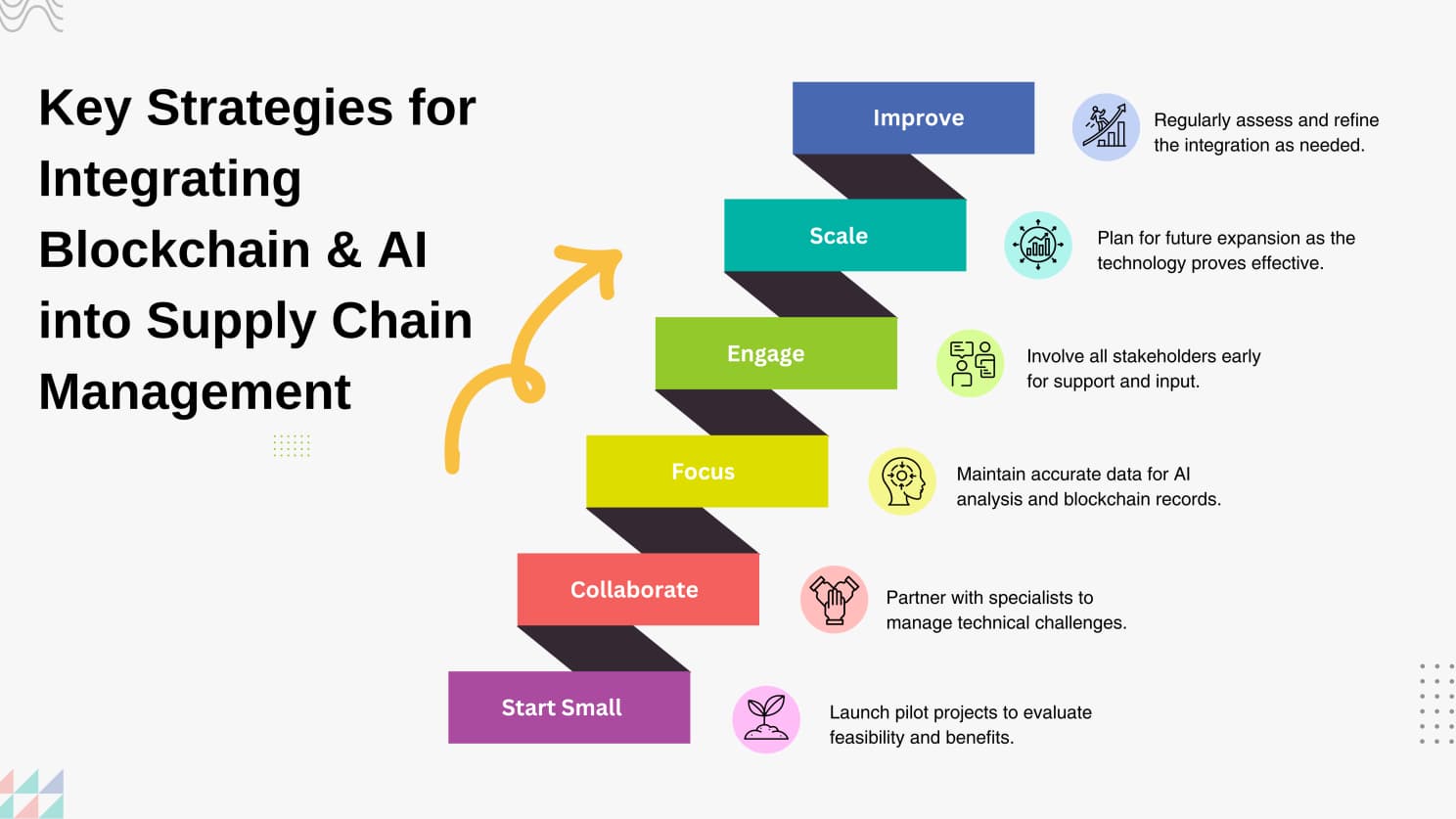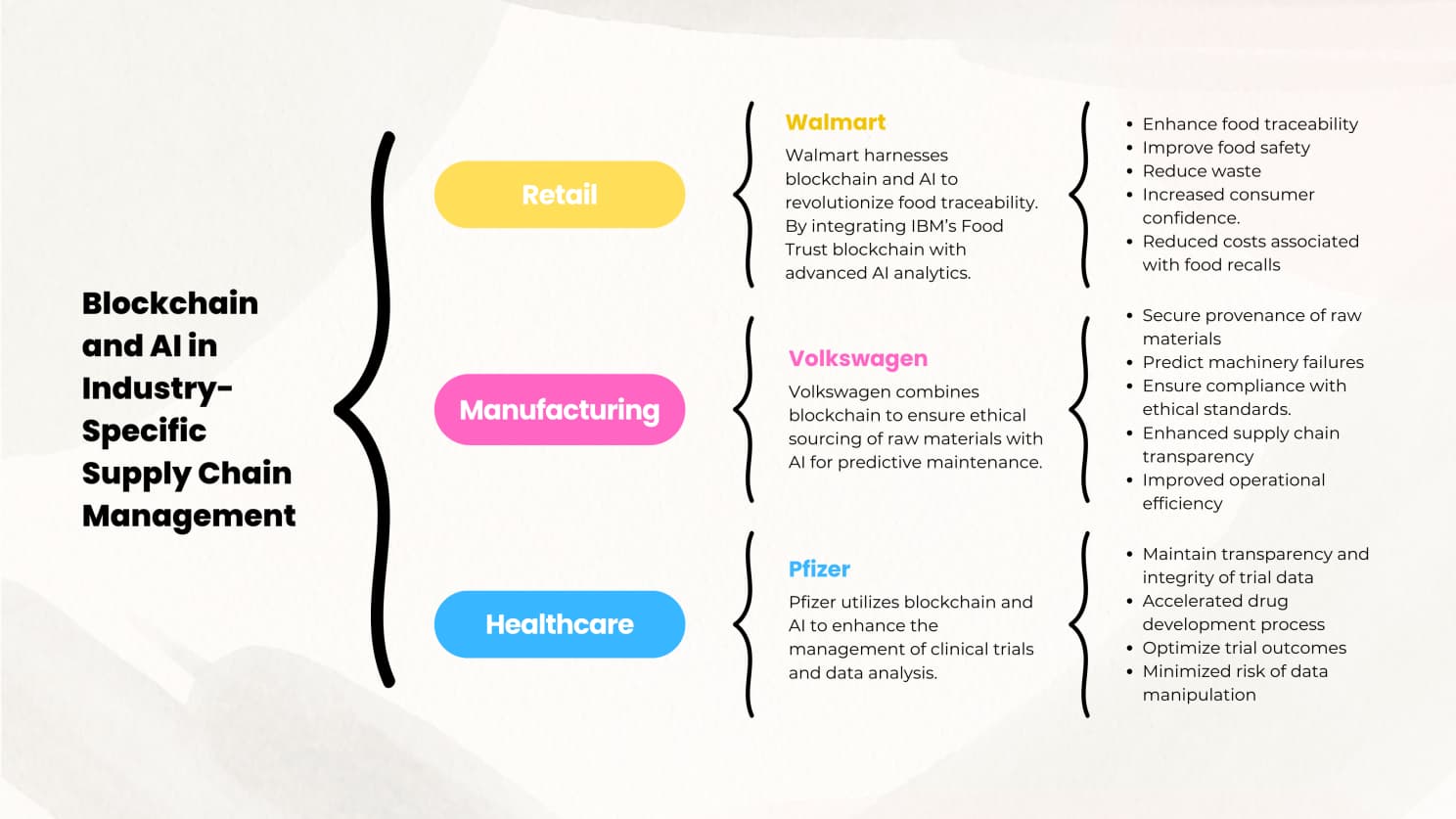Artificial Intelligence (AI) and blockchain technologies are transforming cross-border delivery chains. These innovations enhance efficiency, transparency, and compliance in global trade. As AI streamlines processes and automates tasks, it reduces the need for manual intervention, minimizing errors and delays. Blockchain ensures trust and security by providing an immutable record of transactions. This synergy between AI and blockchain has the potential to revolutionize cross-border logistics, paving the way for faster, more reliable, and cost-effective global trade. AI and blockchain are also transforming supply chain financing. Traditionally, accessing funds for trade required extensive paperwork and lengthy verification processes. However, with AI-powered algorithms analyzing transaction data and blockchain offering transparent and immutable records, lenders can now make more informed decisions quickly. This opens up opportunities for small and medium-sized enterprises (SMEs) that may have previously struggled to secure financing, stimulating economic growth on a global scale.
Explore and Master Your Legal Agreements and Contract Management with AI at Legaliser.com.
Key Points:
- AI in Supply Chains: AI algorithms analyze vast amounts of data to optimize logistics, predict demand patterns, and improve sustainability practices.
- Blockchain Technology: This decentralized ledger system enables secure, tamper-proof record-keeping for tracking information, inventory, and financial flows across supply chains.
Efficient cross-border delivery chains are crucial for businesses to stay competitive in the face of evolving regulations. Effective management of these chains is essential for:
- Reducing costs
- Ensuring timely deliveries
- Enhancing collaboration among stakeholders
This article explores how AI and blockchain can be integrated into cross-border delivery chains. We will examine how these technologies address compliance challenges, streamline operations, and drive innovations such as smart contracts in global trade. Understanding their potential is vital for businesses looking to thrive in an interconnected world.
Understanding AI and Blockchain Technologies
Artificial Intelligence (AI) and Blockchain Technology are changing the game in supply chain management. Let’s break down what each of these technologies means and how they work.
What is AI and How Does it Work in Supply Chain Management?
AI includes various technologies like machine learning and data analytics, all aimed at improving decision-making processes. In the context of supply chain management, here’s how AI can help:
Demand Forecasting: Using past data to predict what customers will want in the future.
Optimizing Inventory: AI can analyze data in real-time to determine optimal inventory levels, minimizing both excess stock and stockouts.
Route Optimization: By considering factors like traffic and weather conditions, AI algorithms can identify the most efficient delivery routes, reducing transportation costs and improving timeliness. More information: Vaka D.K., J Artif Intell Mach Learn & Data Sci, 2024
Enhanced Customer Service: AI-powered chatbots and virtual assistants can provide instant support to customers, addressing queries and resolving issues promptly.
Now let’s move on to blockchain technology and its role in supply chain management.
What is Blockchain Technology?
Blockchain is a system that keeps records of transactions across many computers, making it decentralized. Here’s its main role in keeping records within the supply chain:
Transparency: Everyone involved can see shared data, which builds trust.
Tamper-Proof Records: Once information is recorded, it can’t be changed without agreement from everyone involved.
Traceability: You can track products in real-time as they move through the supply chain.
How Do AI and Blockchain Work Together?
When you combine AI with blockchain, you can make operations much more efficient. AI can analyze the vast amount of data stored on the blockchain, providing valuable insights. For example, it can identify patterns of product demand and suggest inventory levels accordingly. Additionally, AI algorithms can assess suppliers’ performance based on blockchain data, enabling better decision-making in supplier selection. The integration of AI and blockchain technology in supply chain management holds immense potential for streamlining operations and enhancing overall efficiency.
Here are some key benefits:
Better Data Analysis: AI can look at large amounts of data stored on a blockchain to find insights for making better decisions.
Stronger Security: Blockchain provides a safe way to store sensitive information that’s processed by AI algorithms.
Easier Compliance: Following rules becomes simpler because both technologies allow for real-time monitoring and reporting.
By using both AI and blockchain, supply chains become stronger, more efficient, and more transparent.
The Role of AI in Optimizing Supply Chains
AI is changing the way supply chains are managed by offering advanced features that make operations more efficient. Here are some key ways AI is being used:
AI uses past data and algorithms to predict demand trends. This helps businesses:
- Match their inventory with customer needs
- Reduce excess stock
- Minimize shortages
Accurate demand forecasting leads to better inventory management, ensuring products are available when needed.
2. Automation of Logistics Processes
AI tools make logistics operations smoother by automating routine tasks such as:
- Order processing
- Inventory restocking
- Shipment tracking
For example, AI-powered logistics solutions can optimize delivery routes in real-time, resulting in cost savings and improved delivery times. This automation allows human resources to focus on strategic decision-making rather than repetitive tasks.
3. Enhancing Sustainability Practices
AI-driven insights play a big role in sustainability efforts. By analyzing supply chain data, companies can find ways to:
- Reduce waste
- Use resources more efficiently
This includes optimizing transportation methods for fuel efficiency and assessing supplier practices for ethical sourcing compliance.
AI’s integration into international shipping processes enhances customs compliance, ensuring that all regulations are met efficiently. The combination of predictive analytics and automation empowers businesses to navigate complex global trade environments while maintaining a commitment to sustainability and efficiency.
Using these innovative tools gives companies an advantage in the competitive world of global supply chains.
How Blockchain is Transforming Cross-Border Delivery Chains
Blockchain technology plays a crucial role in enhancing cross-border logistics by providing transparency, efficiency, and security. The key benefits include:
1. Supply Chain Transparency
Blockchain enables all stakeholders—buyers, suppliers, and financial institutions—to access real-time data. This visibility fosters trust and accountability, essential for navigating complex regulatory environments in global trade.
2. Streamlining Financing and Coordination
With its decentralized nature, blockchain streamlines financial transactions among parties involved in cross-border trade. Smart contracts automate payments and compliance checks, reducing delays and minimizing errors. This efficiency enhances coordination among disparate entities, accelerating the delivery process.
3. Tamper-Proof Record-Keeping
One of the standout features of blockchain is its ability to create a tamper-proof record of all transactions. This characteristic is vital for addressing issues like counterfeiting and fraud in delivery chains. By providing an immutable ledger of product provenance, businesses can ensure authenticity from the point of origin to the end user.
The integration of AI and blockchain strengthens compliance efforts in cross-border trade. They enable organizations to track shipments accurately while adhering to international regulations seamlessly. Incorporating AI with blockchain enhances not just operational efficiencies but also ensures ethical sourcing and sustainability practices throughout the supply chain.
Moreover, blockchain’s potential for supply chain innovation cannot be overstated. The integration of these technologies offers a robust framework for future-ready cross-border delivery chains that can adapt to evolving market demands while maintaining integrity and transparency.
Challenges in Integrating AI and Blockchain into Supply Chain Management
Integrating AI and blockchain into supply chain management involves several challenges, including technical complexities, data integration issues, and securing stakeholder alignment. These challenges require careful planning, collaboration with experts, and a strong focus on data quality to ensure a successful implementation. By following proven strategies and learning from industry-specific examples, businesses can effectively integrate these technologies to enhance transparency, efficiency, and security within their supply chains.
The graphic below outlines a strategic approach to tackling these challenges, starting from launching small-scale pilot projects to gradually scaling up, engaging stakeholders early on, maintaining high data quality, and continuously refining the integration. Each step is represented visually to highlight the essential strategies for a successful AI and blockchain integration into supply chain management.

Integrating AI and Blockchain for Resilient Supply Chains
Combining AI and blockchain technologies has the power to transform supply chains. This duo boosts transparency, efficiency, and compliance in international trade. It empowers companies to optimize their operations, mitigate risks, and build resilient supply chains. As the world becomes increasingly interconnected, leveraging these cutting-edge technologies will be crucial for businesses looking to thrive in the global marketplace.
Here are the main benefits:
1. Automated Compliance Solutions
AI can monitor complex regulatory frameworks, ensuring adherence to evolving standards. When paired with blockchain’s unchangeable records, businesses can automatically generate compliance reports, reducing human error and operational costs.
AI analyzes vast amounts of data from blockchain networks, providing actionable insights into supply chain dynamics. This helps organizations optimize routes, manage inventory levels, and predict demand with greater accuracy.
3. Improved Trade Finance Processes
Blockchain streamlines financing by offering transparent transaction histories. AI further speeds up this process by automating document verification and risk assessment, thus enabling faster funding decisions for cross-border transactions. More information: Ronchini A et al., Oper Manag Res, 2024 and Zhengdong Luo, arXiv:2408.08915v1 [cs.CR], 2024.
Case Studies
This initiative combines AI analytics with blockchain technology to enhance food safety across global supply chains. By tracing products from farm to table, stakeholders gain insights that lead to faster recall processes and better quality assurance.
2. Walmart
Walmart has integrated blockchain technology to rapidly trace the origin of food products, cutting the tracking time from several days to just seconds. This advancement significantly improves both food safety and transparency within their supply chain. More information: Sharma M & Kumar P, Blockchain Technology and Applications for Digital Marketing (pp.210-225), 2021.
Integrating these technologies not only addresses the complexities of modern supply chains but also creates a resilient framework capable of adapting to challenges in the global trading landscape.

The graphic illustrates how major companies like Walmart, Volkswagen, and Pfizer have effectively applied blockchain and AI technologies to revolutionize their supply chain operations. Walmart has implemented these tools to significantly improve food tracking, ensuring product safety and minimizing waste. Volkswagen uses blockchain for ethical sourcing of materials and AI for machinery maintenance, boosting overall efficiency and transparency. Pfizer leverages these technologies to manage clinical trials, enhancing data accuracy and accelerating drug development. These examples demonstrate the transformative impact of AI and blockchain in optimizing industry-specific supply chains.
Future Trends in Global Logistics Technology
The world of global logistics technology is changing fast, driven by several new trends that are reshaping how businesses work and compete. Here are the key trends:
1. Supply Chain as a Service (SCaaS)
This model allows companies to outsource various supply chain functions to specialized service providers. SCaaS enhances flexibility and scalability, enabling organizations to adapt quickly to market changes without significant upfront investments.
2. Global Trade Digitalization
The shift towards digital platforms is transforming traditional logistics. Automated processes, real-time tracking systems, and data analytics are becoming essential for efficient cross-border transactions. Digital trade is improving visibility and reducing delays in international shipping.
3. Increased Focus on Sustainability
As businesses face pressure to meet Environmental, Social, and Governance (ESG) standards, technology plays a crucial role. Companies are leveraging AI and blockchain to track sustainability metrics throughout the supply chain, ensuring compliance with regulations while minimizing their ecological footprint.
4. Enhanced Data Analytics
Advanced analytics tools allow for predictive insights into logistics operations. By analyzing historical data, businesses can forecast demand more accurately, optimize routes, and improve inventory management.
SCaaS stands out as a critical enabler of these trends. It streamlines cross-border delivery chains by providing access to advanced technologies without necessitating extensive infrastructure investments. This approach fosters collaboration among various stakeholders while enhancing operational transparency and efficiency.
Embracing these future trends positions companies to navigate the complexities of global trade effectively while optimizing their supply chains for resilience and success.
Key Players and Market Growth in SCaaS Market
The Supply Chain as a Service (SCaaS) market is growing rapidly due to advancements in technology and the increasing need for efficient cross-border delivery chains. Key players are shaping this landscape through innovation and strategic partnerships.
Key Players in the SCaaS Market
IBM: Known for its robust blockchain solutions, IBM is enhancing transparency and traceability in supply chains.
SAP: Offers integrated supply chain solutions that leverage AI to optimize logistics and inventory management.
Oracle: Provides cloud-based services that enable real-time data sharing among stakeholders, improving coordination and compliance.
Amazon Web Services (AWS): Their cloud platform supports various SCaaS applications, integrating AI and blockchain to streamline operations.
These companies are not only investing heavily in research and development but also collaborating with startups to harness emerging technologies.
Market Growth Trends
The SCaaS market is expected to grow significantly due to:
Digital Transformation: As businesses increasingly adopt digital solutions, the demand for SCaaS has surged. Companies prioritize flexibility and scalability to adapt to changing market dynamics.
AI and Blockchain Integration: The convergence of these technologies enhances operational efficiency. Businesses can ensure compliance with international regulations while minimizing risks associated with counterfeiting and fraud. 10 AI & ML in Supply Chain Management trends could further drive this integration.
E-commerce Boom: The rise of online shopping has accelerated the need for efficient logistics systems. SCaaS providers are adapting their offerings to meet the demands of global trade, ensuring faster delivery times.
As organizations continue to navigate complexities in supply chain management, the focus on trusted partnerships and innovative technologies will remain paramount. Emphasizing sustainability and compliance will further drive growth within this dynamic market. The insights derived from this management discussion report could be instrumental for stakeholders looking to understand these complexities better.
Streamline Your Legal Agreements and Contract Management with AI at Legaliser.com.
Conclusion: Embracing Innovations for Future Supply Chain Success
Integrating AI and blockchain technologies is crucial for transforming cross-border delivery chains. These innovations not only enhance global supply chain optimization but also significantly improve compliance and risk management.
Key benefits include:
- Enhanced transparency through immutable records
- Improved efficiency with AI-driven demand forecasting
- Sustainable practices aligned with regulatory requirements
Adopting these technologies will empower businesses to navigate complexities in international trade, ensuring resilient supply chains that meet evolving market demands. Embracing these advancements positions companies for success in an increasingly competitive landscape.
FAQs (Frequently Asked Questions)
What is the significance of AI and blockchain in cross-border delivery chains?
AI and blockchain technologies play a crucial role in enhancing operational efficiency, transparency, and compliance in cross-border delivery chains. They facilitate better inventory management, predictive analytics, and tamper-proof record-keeping, which are essential for global trade.
How does AI optimize supply chain management?
AI optimizes supply chain management through predictive analytics that help predict demand patterns, thereby improving inventory management. It also automates logistics processes and enhances sustainability practices by providing insights that lead to more efficient operations.
What role does blockchain technology play in cross-border logistics?
Blockchain technology enhances supply chain transparency and provides tamper-proof record-keeping, which is vital for ensuring compliance in cross-border logistics. It streamlines financing and coordination among stakeholders while addressing issues like counterfeiting.
What are the synergistic benefits of integrating AI with blockchain technologies?
Integrating AI with blockchain technologies leads to automated compliance solutions and improved trade finance processes. This combination enhances operational resilience and provides case studies that illustrate successful applications in cross-border trade.
What emerging trends are shaping the future of global logistics technology?
Emerging trends such as Supply Chain as a Service (SCaaS) and the digitalization of global trade are significantly influencing the future of logistics technology. These trends facilitate more efficient cross-border delivery chains by leveraging advanced technologies.
Who are the key players driving innovation in the SCaaS market?
Key players driving innovation within the SCaaS market include companies specializing in digital transformation, AI, and blockchain solutions tailored for cross-border delivery chains. Their efforts contribute to market growth trends that enhance overall supply chain management.
